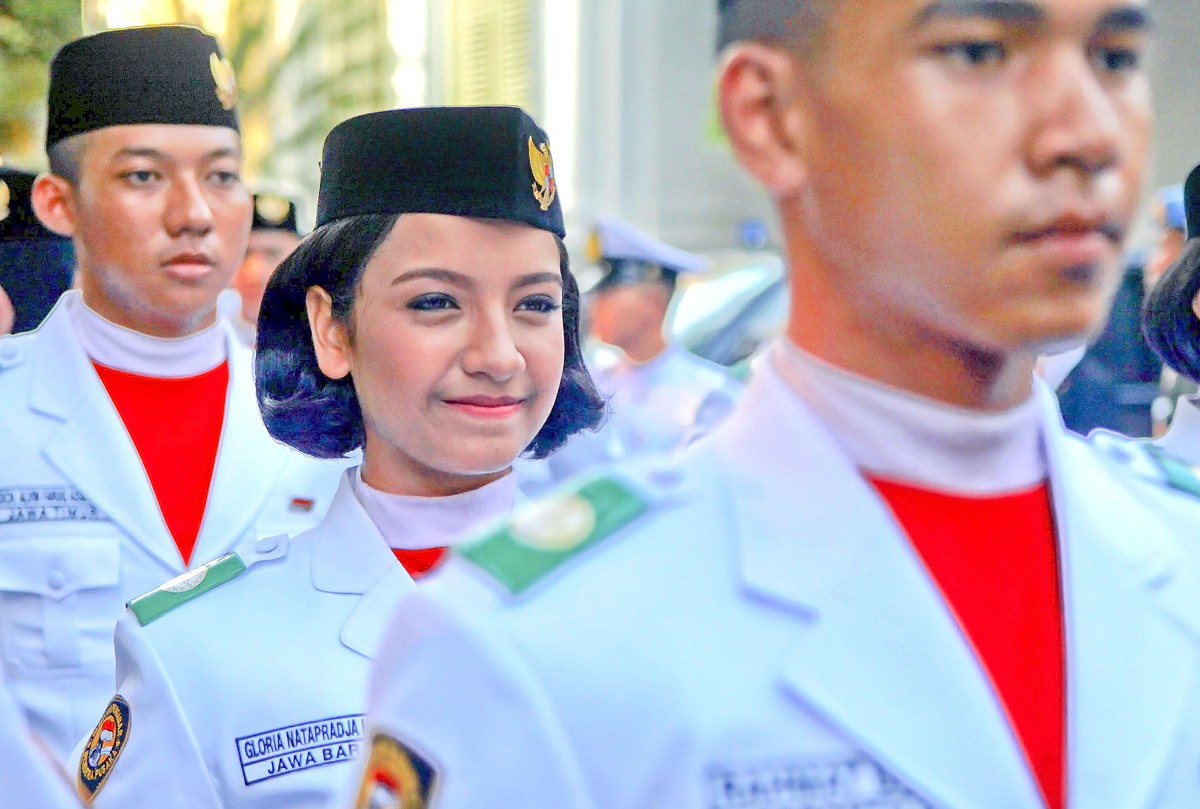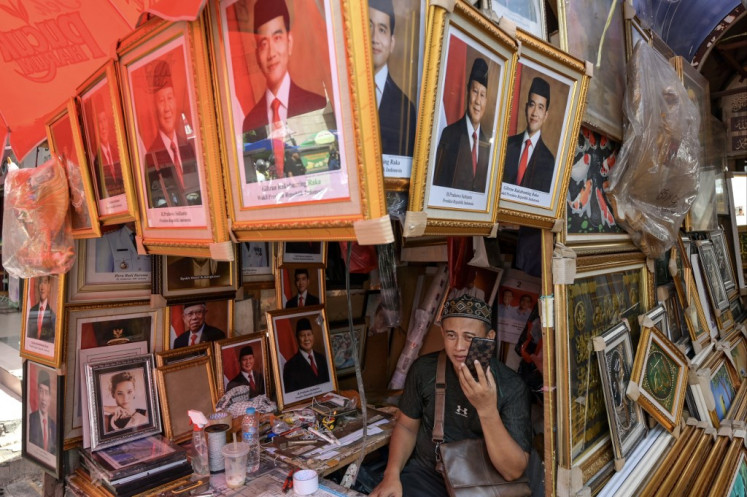Defining Indonesian-ness: Power, nationalism and identity politics
The first question within the first area (identity, diversity and culture) asks: What makes Indonesia “Indonesia”? Based on a premise that the meaning of being Indonesian is always in flux, this question invites researchers to explore various narratives of Indonesian-ness. Prior to 1945, Indonesian-ness was associated with political mobilization against foreign colonizers. After independence, the identity became a political-ideological project directed toward economic prosperity and the stability of the ruling regime.
Change Size
 Back at work: Gloria Natapradja Hamel (second left), along with other members of the national flag-hoisting team (Paskibraka), participates in the flag-lowering ceremony at the State Palace in Jakarta on Wednesday. Earlier, she had been barred from participating in the Independence Day celebrations due to her citizenship status, but she was then allowed to take part in the afternoon ceremony. (JP/Seto Wardhana)
Back at work: Gloria Natapradja Hamel (second left), along with other members of the national flag-hoisting team (Paskibraka), participates in the flag-lowering ceremony at the State Palace in Jakarta on Wednesday. Earlier, she had been barred from participating in the Independence Day celebrations due to her citizenship status, but she was then allowed to take part in the afternoon ceremony. (JP/Seto Wardhana)
A
fter a series of symposiums in 2010-2014, 160 young, reputable doctoral graduates affiliated with the Indonesian Academy of Sciences (AIPI) published a document called “SAINS45: Indonesian Scientific Agenda”. Outlining 45 scientific questions within eight problem areas, the document provides guidelines for Indonesian researchers and policymakers, particularly toward commemorating Indonesia’s centennial in 2045.
The first question within the first area (identity, diversity and culture) asks: What makes Indonesia “Indonesia”? Based on a premise that the meaning of being Indonesian is always in flux, this question invites researchers to explore various narratives of Indonesian-ness.
Prior to 1945, Indonesian-ness was associated with political mobilization against foreign colonizers. After independence, the identity became a political-ideological project directed toward economic prosperity and the stability of the ruling regime.
Considering its new context (post-reformation democracy, regional decentralization and global mobility and interconnectedness), SAINS45 endorses research with a focus on “Indonesian identity in terms of the characters and behaviors of Indonesian people, not political and economic projects” (p. 34). Specifically, it urges Indonesian researchers to “understand and build a comprehensive collection of the beliefs, values, thoughts, characters and behaviors of Indonesian people”.
While this call for defining Indonesian-ness in contemporary contexts is timely and important, there might be some issues worth considering in relation to this agenda.
First, such an agenda might not be completely apolitical, as SAINS45 expects, but still underpinned by political and economic motives, that is, identity and culture as a commodity and resource for enhancing political-economic control.
What is different now is the nature and operation of power. It is akin to what postmodern philosopher Michel Foucault called the disciplinary or modern power. Modern power does not control or dominate people as opposed to premodern rulers’ use of violence to conquer and control the people. Instead, the people are managed, regulated and normalized in ways that support existing power relations.
Through institutions like schools, churches, hospitals, factories and families, the people are transformed into and kept in healthy and happy family units, ready to work productively and serve the interests of capitalist society. To this end, understanding the people becomes a means of political control. We need to know them before we can effectively manage, plan for and regulate them.
SAINS45 itself indicates this political deployment of identity. It states: “understanding Indonesian identity would make planning the future of Indonesia easier to do”, while “failure to do so might impede national development, and result in social conflicts and disintegration” (p. 34). “These efforts are aimed to develop harmonious lives and bring happiness to Indonesian individuals,” it adds (p. 35).
Second, we might need to examine closely ideas that have given rise to SAINS45’s call to define Indonesian-ness.
Besides the 17 members of its committee, eight problem areas and 45 questions, which represent Indonesia’s date of independence (Aug. 17, 1945), the very question of what makes Indonesia itself demonstrates an explicit focus on national identity building. Concerns around disintegration, decentralization, ideological conflict based on identity, national development, collective identity and the essence of Indonesian-ness are salient in this SAINS45 document.
While a discourse of nationalism enables an appearance of closure or unity, which is politically crucial for maintaining Indonesia as a nation state, it also constrains other ways of seeing, thinking and doing. For instance, it (re)produces an “us and them” attitude with regards to globalization, resulting in an unquestionable policymaking priority on national prosperity instead of a fair and just global world.
In times of crisis, rather than finding alternatives to the zero-sum nature of the global economic game, the focus is “let’s save ourselves”. Care and compassion are then limited to fellow Indonesians, which to a certain degree, might less-humanize others. A dominant discourse of nationalism could reduce our humanness into Indonesian-ness.
The third concern regarding this attempt to define our Indonesian-ness surrounds the mechanisms of identity politics operating underneath it.
In order to recognize and protect the rights of diverse groups of people, their identities must first be understood, defined and specified – this is the logic of identity politics. The problem with this mechanism is that there are always people who do not feel related to and thus are left out by those definitions and specifications, however complex and comprehensive those descriptions of identities are.
While SAINS45 notes that “articulating Indonesian identity must be conducted with respect to the extraordinary diversity of Indonesia” (p. 34), it also seeks to identify “core beliefs, moral foundation and collective wisdom which unify us” (p. 35). There is a possibility that in our attempts to define Indonesian-ness we might purport to acknowledge differences, while at the same time pinpoint what it means to be Indonesian only to some limited representations of our diverse ways of being.
To describe what it means to be Papuan as a part of Indonesia, for instance, might not always be relevant to all Papuans considering the diversity and complexity of the relationship between Papua and Indonesia. Our project of inclusion could become a means of exclusion.
To conclude, defining our Indonesian-ness might enable the recognition of the diversity of our identities and cultures to a certain degree. At the same time, such ambition inevitably simplifies the irreducible complexities of our ways of being Indonesian. Understanding the diversity of our identities might improve national strategic planning and policymaking, but simultaneously, it enhances power’s grip upon our lives.
Perhaps a more important project toward more democratic, humane and diverse Indonesian lives is to continuously resist, rework and recreate whatever theorizations those researchers came up with to articulate our identities, in ways that address inequalities, oppression and injustices. In so doing we would encourage radical diversity, that is, a proliferation of new ways of being Indonesians, and being humans.
***
The writer is a lecturer at the University of Surabaya and a PhD student at the University of Auckland, New Zealand.
---------------
We are looking for information, opinions, and in-depth analysis from experts or scholars in a variety of fields. We choose articles based on facts or opinions about general news, as well as quality analysis and commentary about Indonesia or international events. Send your piece to community@jakpost.com. For more information click here.









